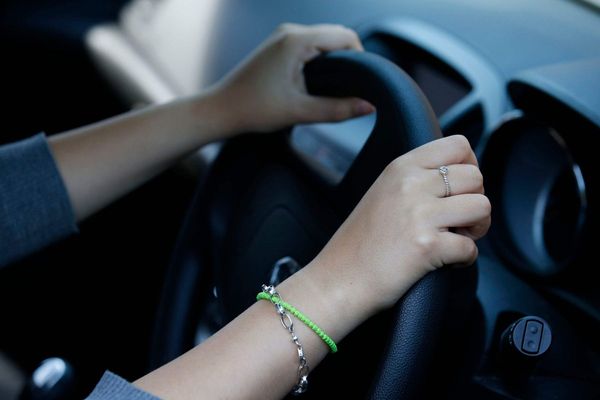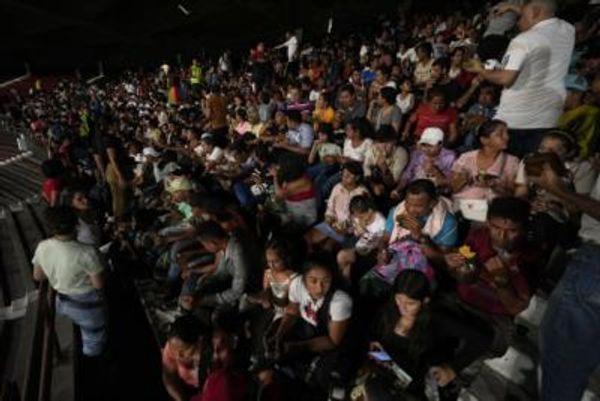Olympians Caeleb Dressel and Suni Lee are the recipients of the 2021 Sports Illustrated Athlete of the Year award for their medal-winning performances in Tokyo at the Summer Games. For more Sportsperson of the Year coverage, click here.
Shortly after HIs triumphant return from the Tokyo Games, Caeleb Dressel posted two pictures of himself on Instagram with the caption, “Same but different.”
One showed Dressel as a shirtless toddler: his hands pushing at the small of his back, his belly pooched out over his pants, his head covered by a coonskin cap. He was not smiling.
The other was Dressel as a shirtless Olympic hero, with his collection of five freshly won gold medals hanging around his neck. His hands again were pushing at the small of his back as he tried to distend his stomach, though that’s not easy for someone with perhaps the most renowned six-pack on the planet. He wore a cowboy hat instead of a coonskin cap. He still was not smiling.
Same but different.
In so many ways, those close to Dressel say he still yearns to be the carefree Florida farm boy he once was in Green Cove Springs. His intensity is undercut by an endearing, childlike goofiness. But at age 25 he is different now. And few things can change life more profoundly than single-mindedly pursuing greatness only to achieve it—which he did by hauling in the most gold medals of any athlete at the Tokyo Games.
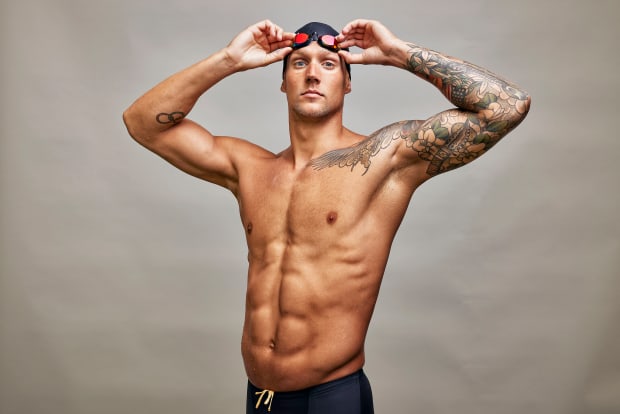
Simon Bruty/Sports Illustrated
Dressel has been swimmer-famous for a long time, since his mid-teens. His celebrity started to spread as an NCAA record holder at Florida, then broadened further in 2017 as he became the electrifying successor to Michael Phelps as the world’s best male swimmer. The ramp-up to Tokyo placed him in a still-greater spotlight, which became a global klieg light when he delivered spectacularly amid huge expectations.
Gold medal No. 1: With his unparalleled speed off the blocks, Dressel assumed the leadoff position in the American 400-meter freestyle relay. After he staked his teammates to a .26-second lead, Blake Pieroni, Bowe Becker and Zach Apple followed up to put the U.S. on top of the medal podium in 3:08.97.
Gold medal No. 2: Dressel’s first individual gold came in the 100 freestyle, where he held off reigning Olympic champion Kyle Chalmers of Australia by .06 seconds to win in 47.02. After two relay golds in 2016 and the 400 free relay medal three days earlier, this one was special to Dressel, who was in tears on the podium. When he had an emotional interaction on TV with his wife, Meghan, and parents—all watching from Orlando, thanks to COVID-19 restrictions—America fell hard for Dressel.
Gold medal No. 3: Dressel’s finest swim at the Games was in the 100 butterfly final, when he broke his own world record with a time of 49.45 seconds and staved off a furious rally from Hungarian Kristóf Milák.
Gold medal No. 4: Dressel blew away the field in the 50 free, winning by .48 seconds. That’s a relative chasm in the shortest event; the time differential between silver and eighth place was a mere .24. Dressel became just the third U.S. male to win three individual golds in a single Olympics, joining Phelps and Mark Spitz.
Gold medal No. 5: Coming back in the same session after winning the 50, Dressel swam the butterfly leg for a U.S. 400 medley relay team that was in danger of losing the event for the first time in Olympic history. Swimming in lane 1, the Americans responded with a world-record effort of 3:26.78.
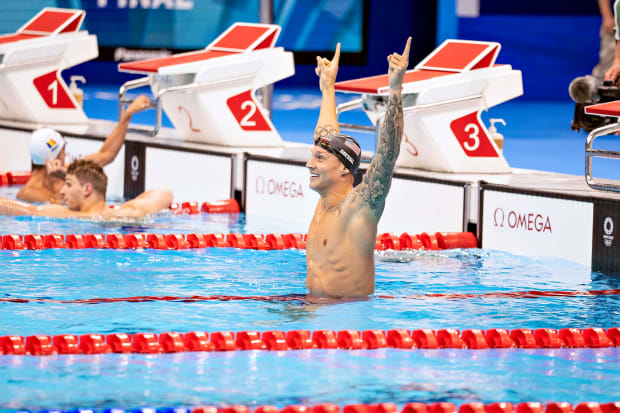
Erick W. Rasco/Sports Illustrated
After the victory, physically and mentally spent, Dressel leaned heavily on his relay teammates just to stay upright. He finally acknowledged the weight of expectation that he had lived with since it became clear he was the next American Aquaman.
“There’s so much pressure in the moment,” he said. “Your whole life boils down to a moment that will take 20, 40 seconds. How crazy is that? And it’s every four years. I wouldn’t tell myself that during the meet, but it’s terrifying. A lot of it boils down to a very precise moment in the universe, and that just happens to be the Olympics.”
A perfectionist child, Dressel used to line his crayons up in precise formation, wanting them all to be the exact same height. If he lost a Lego, he despaired. In Tokyo, the crayons all lined up just right; each Lego was in its place.
But there is life after the Olympics, and it’s often not easy. Always an intense competitor and an emotional person, Dressel came home burned out. His realization, his agent says: I need to breathe.
The acclaim and glory and increasingly long list of sponsors were nice, of course. Dressel took a Las Vegas trip with Meghan, went on a cruise with his parents and siblings, was honored at a Florida football game. People named him “Sexiest Olympian,” which was probably his easiest victory of 2021. But the mental toll of everything that went into his Tokyo tour de force was real. He had to disconnect for a while.
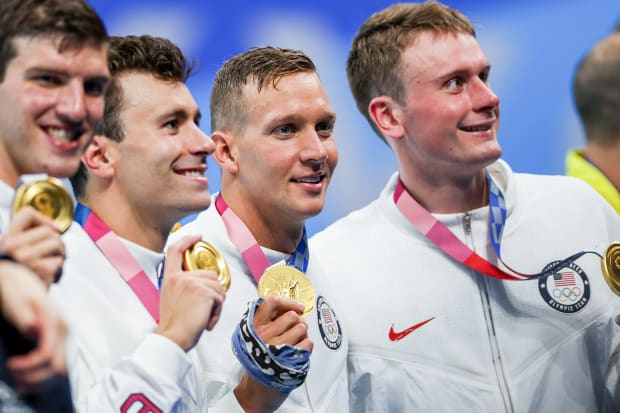
Simon Bruty/Sports Illustrated
Part of his downtime was filled by extending his lengthy tattoo collection. Dressel began work on a full right-leg sleeve that will be the yin to his left-arm sleeve’s yang. Just the outlining took 14 hours; next it will be filled in. By Paris 2024, he will be a kaleidoscope of color flashing through the water.
Pushing himself, Dressel met his obligations to compete in the International Swim League (its season started just weeks after the Games ended), but at home he decided it was time for a change. After seven years with Gregg Troy—first in college, then as a postgrad—Dressel has changed coaches. He’s staying in the same pool but moving over to current Gators coach Anthony Nesty and sprint coach Steve Jungbluth. Dressel is now the headliner of a powerhouse freestyle training group that includes Florida undergrad Olympians Bobby Finke and Kieran Smith, and recent arrival Katie Ledecky, the distance legend who moved her base from Stanford.
Same but different. Changed by both the pursuit and achievement of Olympic glory, Caeleb Dressel is doing his best to stay in touch with the little perfectionist, pot-bellied boy within.


